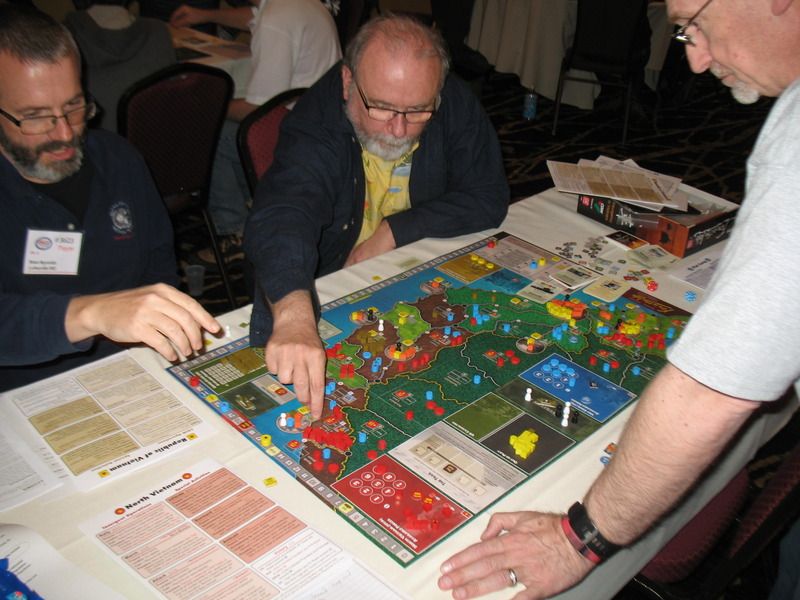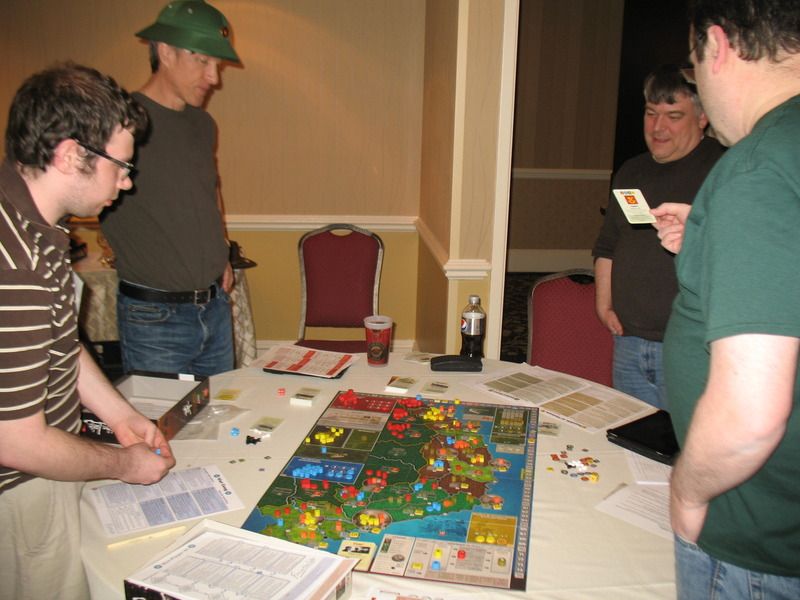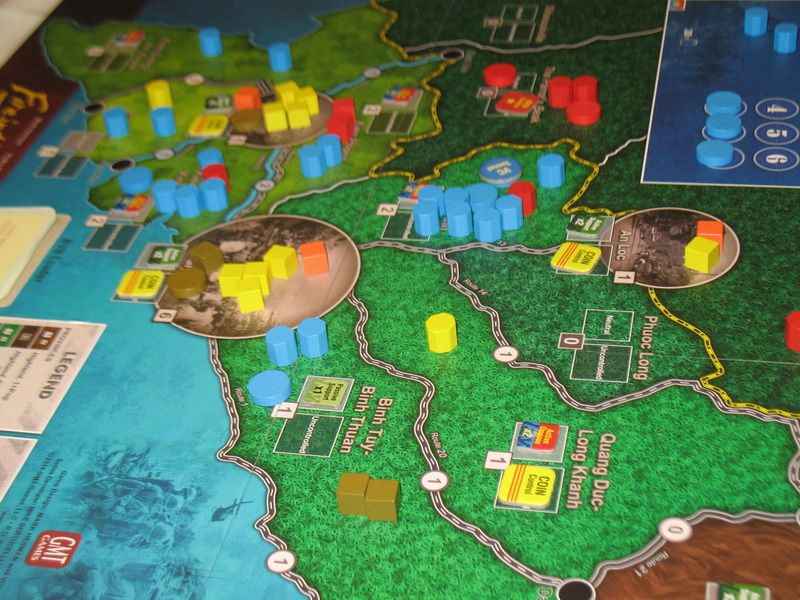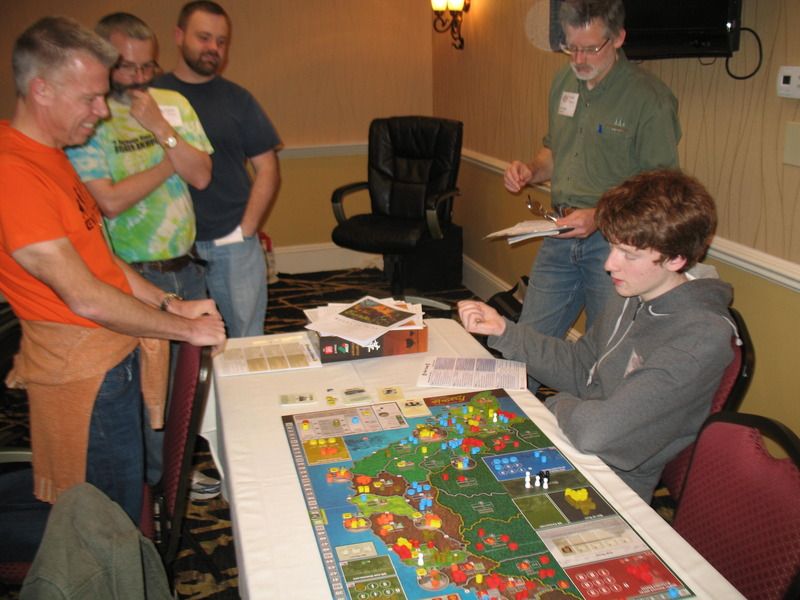PREZCON REPORT: Mark Herman and Volko Ruhnke’s Fire in the Lake
Tuesday , 1, March 2016 Wargames 6 Comments The fan base for this game has changed quite a bit over the past year. The last time I played this one, it was difficult to find a table with even one player that was fluent in the game. The first two heats of the tournament games then were liable to have more than one person that had only played once or even not at all. This year, though, there were a great many strong players contending for the chance to stay up well into the night playing an eight hour long scenario recapitulating the themes of the Vietnam War with some of the best gamers in the country.
The fan base for this game has changed quite a bit over the past year. The last time I played this one, it was difficult to find a table with even one player that was fluent in the game. The first two heats of the tournament games then were liable to have more than one person that had only played once or even not at all. This year, though, there were a great many strong players contending for the chance to stay up well into the night playing an eight hour long scenario recapitulating the themes of the Vietnam War with some of the best gamers in the country.
But just what is this game, anyway…?
Is it a wargame or a Euro? It really is hard to say. It’s certainly got the wooden bits and impeccable production values that people expect from top of the line “heavy” Euro games. Those little cubes representing American and NVA forces sure can blow each other up. And the card deck is loaded with the sort of historical details that you’d expect from a game with Mark Herman’s name on it.
I think it comes down to who you’re playing with and what they expect it to be as much as anything. The first time I played this, it was a long playtest scenario that we didn’t even get all the way through. Nevertheless, the emergent frustrations, aggravations, and paranoia on the part of the players was very real and very surprising aspect of the design. The need for the US player to pay attention to winning hearts and minds was completely new to me in a wargame. The idea of a war where the two sides are made of unreliable allies that often end up working at cross purposes was just plain neat.
Of course, the thing that made it so engrossing for me is the exact thing that makes the game hard to get into for other people. Some critics just can’t get past the fact that this game presents the Viet Cong as being an entirely different faction from the NVA. As just one example of that, I overheard someone muttering last week that they just wished that GMT games would admit that they were overlaying this COIN system onto situations where it really didn’t fit. (Wargamers are a tough crowd sometimes….)
Another thing people struggle with is the “bash the leader” aspect. One person will pull out ahead and then all of a sudden, every other faction discovers that they could all benefit by pausing the game long enough work out exactly what they need to do in order to bring them back in line, completely killing the theme in the process. This is such a buzz kill for some groups, I’ve seen some people go so far as to insist that people not keep up with the scoring track at all and just wait for the coup card to come out before they count things up.
I can understand the frustration. If the players at the table really do see the game as nothing more than a heavy Euro with a strong leader bashing element and– going beyond that– expect everyone to treat it that way even when it doesn’t make sense, then yeah, that scoring track can get pretty aggravating. I mean, if I really wanted to play that sort of game, there are plenty of them that can pull it off with less complexity and with much less of time commitment. Not being much of a Euro gamer myself, this whole idea of a “generally accepted appropriate move” that you can be shamed or browbeaten for not taking is anathema to me. At the same time, the fact that this game can bring people together from such divers segments of gaming together is I think a good sign. There might be some friction because of this, but people from outside of the usual wargaming crowd are keen on playing this.
 That said, when that coup card is due to come out at any time and there are players that are in position to win and the game is close and nobody knows how it’s going to really shake out, I have to say the rules really can fade into the background and some kind of alternate universe Vietnam type experience manages to come through. You can see it in the way that people start standing up for the last thirty or forty-five minutes of a game. Yeah, people will dismiss this game for any number of reasons. But it sure seems to work for the people that show up. And the nail-biting tension really seems to bring people back for more. Weird things can happen in this game, though. And people get really invested in the outcome in a way that I just don’t think I see happening with the “real” Euro games.
That said, when that coup card is due to come out at any time and there are players that are in position to win and the game is close and nobody knows how it’s going to really shake out, I have to say the rules really can fade into the background and some kind of alternate universe Vietnam type experience manages to come through. You can see it in the way that people start standing up for the last thirty or forty-five minutes of a game. Yeah, people will dismiss this game for any number of reasons. But it sure seems to work for the people that show up. And the nail-biting tension really seems to bring people back for more. Weird things can happen in this game, though. And people get really invested in the outcome in a way that I just don’t think I see happening with the “real” Euro games.
Playing in the PrezCon tournament this year, I drew the NVA in the first heat. This is the faction that I ended up playing three times in a row last year, so I was pretty comfortable with the basic tactics of the reds going in. I had a strong second place finish in the game, making me once again sort of a first rate second rate player. In the second heat I was saddled with playing the US– something I had never done in a tournament game. I didn’t really think I had much of a chance because the relationship between the US and ARVN factions just seems downright toxic at times. From the perspective of the NVA, the US and ARVN spend so much time dealing with each other, they seem to end up handing them a huge advantage when the need it most.
I’d never met my “ally” before, so I suggested that we ignore usual point track tug-of-war in favor of stomping on the VC and NVA pieces as much as possible. I couldn’t really get a feel for how this really went over with the ARVN because he didn’t really get a word in edgewise once the NVA player started to heatedly explain that this was just plain wrong. See, he’d taken my request as meaning that I was planning to just hand the game to ARVN right there. I countered that the other factions had the capacity to keep ARVN in line if they really wanted see to it, but I was going to focus on directing my fire at someone other than my esteemed ally.
I think this really was a pointless argument in the end. The game system is robust enough that or conceptions of how we thought the game should play were out of step with what the game actually does to people. ARVN never really threatened to run away with the game and somehow I ended up out in front at some point. The VC managed to creep up the ranks but was beaten back. As the game settled into the last set of cards before the third coup turned up, the standings swung back and forth between the NVA and the USA. The game really seemed to take on a life of its own. And most importantly, we really started to care about the outcome. In the first stage of the game, it doesn’t seem like you can really accomplish all that much with a turn, but at the end, every little ripple and speed bump suddenly seems like a big deal.
 When the final coup card came out, I was sitting pretty with two points more than what I needed to win. The NVA were right on my heels, but I was still ahead of them. The VC were in position to take one point away from me– just not enough to make a difference. This was it, right? My string of really great second place showings was about to end, huh?
When the final coup card came out, I was sitting pretty with two points more than what I needed to win. The NVA were right on my heels, but I was still ahead of them. The VC were in position to take one point away from me– just not enough to make a difference. This was it, right? My string of really great second place showings was about to end, huh?
Except… the NVA player noticed that if the VC walked out of a particular location, control would shift back there to the NVA, giving him two points. That move would tie them with me– and because the NVA wins ties, that would put me in second place yet again.
The VC player was really at a loss for what to do. He was backed into a corner where he was going to end up playing kingmaker no matter what he did. (In Euro circles, this strikes me as being among the most cutting accusations you can lay on someone at the table.) He called Volko over to find out if his decision would put anyone out of the final. I’m not sure if that helped or not, but it sure got everyone paying attention to this last move of the game…!
In the end, the VC player decided to roll a die to determine the winner:

The dice indicated that he would walk out of the location and give the game to the NVA. And that… was how I ended up losing the game and failing to make it into the tournament.
The NVA player helpfully pointed out to me that I had actually done this to myself– there was a base that I could have removed from the board during the previous coup phase that would have given me the one point I would have needed here. But maybe going into the jungle to send a US cube to out of play in exchange for an easily replaced NVA base was a bad idea, too. Just in general, I think you need to not throw your full weight on any section of the board and there were definitely where I had overdone it. (If things are impossible in any one region, the players will just back off and head to places where they can actually put pressure on you.)
The important thing here to me is that even after five tournament games, Fire in the Lake is still just as engaging and inscrutable as ever. The best moves and most effective strategies just aren’t that obvious. I don’t expect this one to get stale any time soon. Although the learning curve is a bit steep with this entry in the COIN series, the game is well worth the investment. The four factions behave so differently from each other, it’s almost like getting four games in one. That’s something that makes this a surprisingly good gaming value.
Fantastic play report, Jeffro. I suspect that the kingmaker aspect will come more to the fore the more FITL is played. I haven’t done the reading to really pronounce on the historicity of the VC/NVA thing, but my spidey sense is tingling. I don’t have nearly as deep a knowledge of this as you do. I’m agnostic as to whether this is a fault of design but it is a real jeopardy. In any event, this is way more lively than yet another snake dance.
I had no idea COIN tournaments were a thing. I’ve played Andean Abyss, Cuba Libre, and A Distant Plain, but not Fire in the Lake yet. I’ll have to keep an eye out for a chance to play multiple games in a weekend. Great report.
Ok, I hadn’t investigated COIN that much yet, but I’m now intrigued. More on the Euro side of things, but I’ll play LOTS of stuff. Pendragon might be what I go with, but that’s in p500 still. Any thoughts on favorites?
Colonial Twilight (the Algerian War game) is bumping through playtesting right now. With 2 players it’s a very different kind of contest: like a 4-player game, only 2 factions do something in any given turn but the tempo is cranked way up. The short (1960) scenario of 3 Propaganda Rounds plays in 90-120 minutes between two non-paralytics, making it ideal for tournaments (when we get to that point).
Nice report, really wish a last minute business trip did not rule out me attending PrezCon this year, you guys sure look like you had tons of great play!
With regard to the “alliances”that are not, I have read enough about the Vietnam War to realize that everybody had very significant agenda differences, and for instance the ARVN “governments” would certainly not have hesitated playing some local deals to avoid the US agenda to prevail without theirs progressing. Similarly, the readiness to cut some kind of deal with the Commies was quite different between the “allies”…
In my own Pendragon, the two Britin factions are united by (initially) shared institutions and a need to oppose Barbarian raiding, but the Civitates (civilians) also want to shake off the central rule (of Rome or its surrogate, the army, i.e. the Dux faction), and the Dux holds some very specific ideas as to what constitutes an acceptable solution to the Barbarian issue… And so, strife between the two may not be the norm but is certainly common enough…